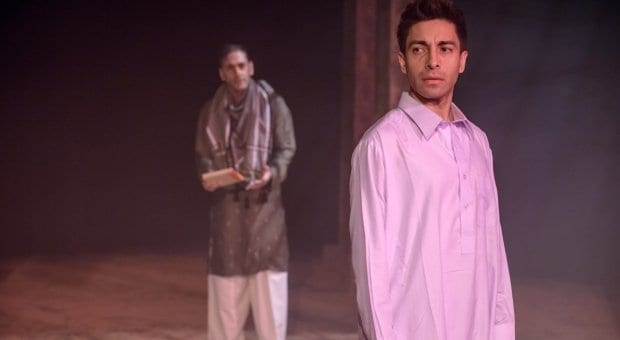Playwright and performer Kawa Ada is about to take a big risk.
Ada’s new play, The Wanderers, opens at Buddies March 6, and he talks with the special edge in his voice of an artist about to present a very personal — and likely divisive — new work. “It’s just a matter of settling into the enormity of this play,” Ada explains. “I didn’t truly appreciate what a dense, dense thing I’d created.”
The Wanderers tells the story of a family that flees the war in Afghanistan only to discover the trauma of their experience has followed them to Canada. It also happens to be very similar to Ada’s own story. “The first part of my life was all about displacement,” he says. “And then the second was, you know, finding freedom here.” For Ada, that freedom includes identifying as queer, which is a major part of his epic, funny, political and semi-autobiographical show.
Which brings us to the big risk. “There hasn’t been a time in my adult life when I’ve shied away from expressing my pride in being a queer Afghan-Canadian,” Ada says. “But, for the safety of my family and the safety of those I love who are Afghan, I haven’t truly talked about it in a public sense.”
In Afghanistan, homosexuality is a crime punishable by imprisonment and sometimes execution. “People in the 1980s and ’90s were stoned for identifying as gay or being caught in anything that wasn’t the heteronormative,” Ada says, which may help explain why queer sexuality remains a taboo for many Afghan-Canadians. “I don’t know of an Afghan-Canadian queer community; I’m almost positive that it doesn’t exist.”
For most people in the West, it’s probably impossible to think about Afghanistan without thinking about the Taliban, the war, burqas and Islamic fundamentalism. But Ada is quick to remind us how relatively recent all those things are. “Before the Soviet invasion, Afghanistan was at the height of modernity,” he says. “And in the 1960s and ’70s, it was actually looking towards becoming one of the more progressive Islamic states.”
As well as being the author of The Wanderers, Ada is also a cast member, which undoubtedly makes the prospect of opening night even more nerve-wracking. But, as Ada says, he “wanted to take a lot of risks with this play,” and, given his passionate commitment to the story he wants to tell, we can’t help thinking they’re bound to pay off. “There has been so much rhetoric and so much written, particularly by playwrights, about the Afghan war, about Canada’s place in the war with Afghanistan,” he says. “And I so desperately wanted to write something from an Afghan perspective. Because it hasn’t existed yet.”
The Wanderers opens Thurs, March 6 and runs until Sun, March 23
Buddies in Bad Times Theatre, 12 Alexander St
buddiesinbadtimes.com

 Why you can trust Xtra
Why you can trust Xtra


